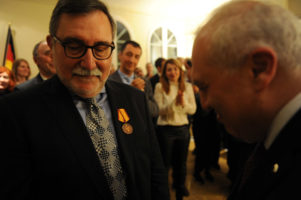HANOVER, Germany — The resolution passed in Berlin in 2016 recognizing the Armenian genocide was a watershed. Not only did the Bundestag (Parliament) take the final step in acknowledging that what occurred in the Ottoman Empire in 1915 was a genocide, but it outlined provisions for educating the population on this crucial chapter in modern history.
In the text of the document, it is stated that “Today it is the responsibility of school, university and civic education to take up and work through the expulsion and extermination of the Armenians as part of the process of dealing with the history of ethnic conflicts in the 20th century, in curricula and teaching materials, and to pass this on to the next generations. In this respect, the federal states have a special role to play.”
In the German system, curricula for public schools are the responsibility of governments at the federal state level. Prior to the passage of the resolution, it was up to the individual teacher to decide what examples to use in courses on genocide and mass murder in modern history. Brandenburg, which introduced instruction on the Armenian Genocide in 2005, was followed a decade later by Saxony-Anhalt, which made teaching materials on the subject available. But it was only with the Bundestag’s action that legislators redefined the matter, spelling out provisions for implementation.
What has occurred since then? At public events commemorating the victims of the genocide on April 24 each year, speakers have lamented the fact that very little has changed. This year, Dr. Elke Hartmann, speaking in Berlin, stressed that it was not only a matter of reorganizing curricula, but of providing educators with the in-depth knowledge required to teach competently. She called for the establishment of university chairs as well as the preparation of scientific materials for the classroom.
Politics at the Federal State Level










